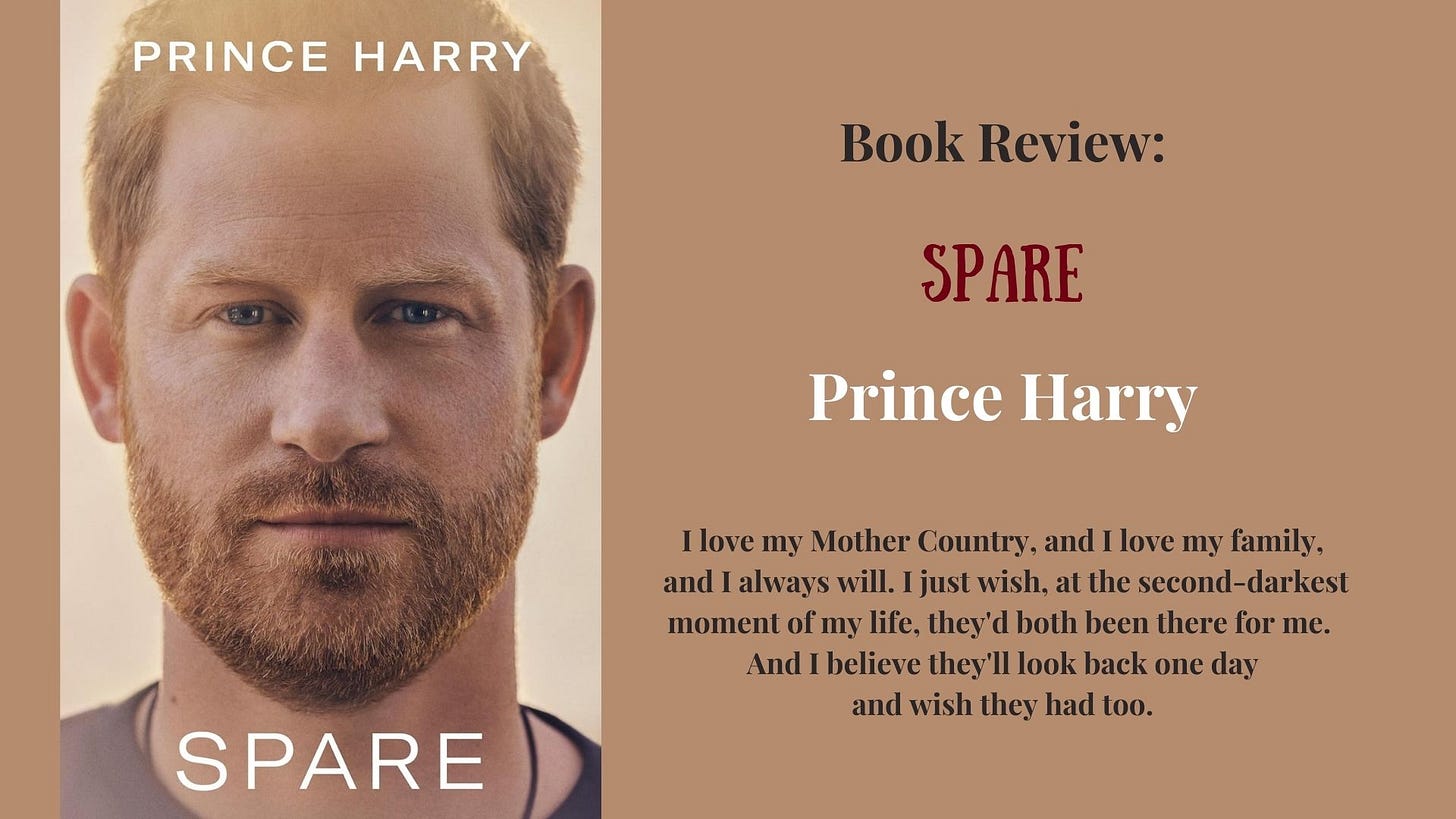10 Spare by Prince Harry
I love my mother country, and I love my family, and I always will. I just wish, at the second darkest moment of my life, they’d both been there for me.
— Prince Harry
Two Perspectives on Spare
When it came out, Prince Harry’s memoir Spare split readers right down the middle. Some cheered—good for him—while others scoffed—how dare he. The book sparked headlines, heated debates, and left plenty for armchair analysis.
Let’s take a moment to address the critics—not because their opinions hold weight (as Teddy Roosevelt warned us—the critics don’t count)—but because these questions echo the challenges every memoir writer, royal or not, must eventually face.
Why Write a Memoir?
Harry opens with a scene straight out of a Shakespearean drama—a tense conversation with his father and brother after Prince Philip’s funeral. They can’t understand why he left the royal castle and moved his family to America. So he wrote his memoir, hoping they’d one day see things through his eyes.
But here’s the truth—memoirs aren’t written to win family approval. Ask any memoir coach and they’ll tell you—memoirs exist for personal clarity, creative expression, and forging connections with others walking similar paths. They’re about setting the record straight, honoring the past, and—most importantly—reclaiming one’s narrative. Rarely does the family rise up to applaud. And unsurprisingly, the Royal Family is no exception.
Addressing the Critics
So what exactly are the criticisms Harry faces—and how do they reflect the concerns of memoir writers everywhere?
“Why Air Dirty Laundry?”
Harry’s life has been tabloid fodder since birth. Lies about him being a skinhead, drug addict, or rehab groupie have sold papers for decades. Spare isn’t about creating drama—it’s about correcting the record. Harry pulls back the curtain on the PR maneuvers orchestrated by his father and stepmother to rehab their images after his mother Diana’s death—often at his expense.
For memoir writers, the takeaway is clear—telling the truth about what really happened isn’t airing dirty laundry. It’s reclaiming the narrative others have tried to hijack.
“Why Not Just Disappear?”
Easy to suggest, but impossible in practice. Harry isn’t some minor royal who can fade into obscurity. The press hounded him from day one, and even in the remotest African bush, he couldn’t fully escape. Writing his memoir became his way to carve out peace, raise awareness about mental health, and connect with people facing similar struggles.
For most memoir writers, disappearing isn’t the goal—it’s about finding peace through self-expression.
“What About Other Perspectives?”
Ah yes—the classic but what will they say. Memoirs aren’t encyclopedias cataloging everyone’s feelings. They’re one person’s lived experience. If others disagree, they’re free to write their own version.
“Won’t This Destroy the Family?”
Let’s get one thing straight—it’s not truth-telling, but abuse, secrecy, and dysfunction that destroy families. Harry’s exposure of toxic patterns mirrors an old Alcoholics Anonymous saying—we are only as sick as our secrets.
You own everything that happened to you. Tell your stories. If people wanted you to write warmly about them, they should have behaved better.
— Anne Lamott
“Is It Cringey?”
Sure—some moments, like the infamous frostbite episode before William’s wedding, might make readers squirm. But it’s the awkward, human moments that make a story credible.
“Is Ghostwriting Cheating?”
Harry’s ghostwriter, J.R. Moehringer, may have polished the prose, but the life and experiences? All Harry. Ghostwriters don’t invent—they distill and shape. Whether dictated, scribbled in longhand, or whispered into a phone, the memoir’s heartbeat belongs to its author.
How Spare Aligns with the Fairytale Lens
1. A Hero Who Transforms
A prince born as the spare loses his mother and becomes the family scapegoat—only to risk it all for the woman he loves. It sounds like a fairytale, but this is Harry’s lived experience.
2. A Villain Who Neglects or Abuses
The King of England and his wife are among the villains here, but the paparazzi get top billing for their crime of killing his mother.
3. A Fairy Godmother Who Empowers
Harry had a few good mentors along the way, but chief among them is a friend who offers him advice and solace in the African bush.
4. A Kindred Spirit for Companionship
When Princess Diana was killed, his older brother, Prince William, was his kindred spirit. The two of them alone understood their pain. He also seems close to his cousins.
5. A Life-and-Death Struggle
He may have been born a prince, but Harry’s challenges—grief, mental health battles, family estrangement—are real and resonate as life-or-death struggles.
6. A Three-Act Story
Innocence before his mother’s death, turmoil in adolescence and military service, and transformation through marriage and self-exile—build into a classic three-act story.
7. Magical or Spiritual Elements
This story might be about a prince, but Harry has not lived an enchanted life. There are a few magical moments, though—with his love of Africa and his romance with Meghan.
8. An Ending That Resonates
Spare breaks the royal family’s tradition of silence with a stiff upper lip. It’s nostalgic, poignant, sometimes humorous. It offers the reader an intimate, human glimpse behind the palace gates. Harry’s own audiobook narration, with his charming accent, only deepens that connection.
What I Love About This Memoir
As a lifelong “Royal watcher,” I didn’t feel Harry was asking me to hate his family members—he simply wanted me to listen to his story. He left space for me to root for his brother, Prince William, and the rest of the family—while also applauding his choice to move forward with Meghan.
By telling his story, Harry reminds us—when we stop keeping secrets and start speaking our truth, transformation becomes possible. And that, dear writer, is where the real magic of memoir happens.
NOTE: This is an excerpt from How to Frame Your Memoir Through the Fairytale Lens.
The Fairytale Lens © 2025 Cherilyn Christen Clough. All rights reserved.



Súper great insights, Cheri!
Beautiful review. Yes, the thoughts are his own. I hope his words can help his family. Your insights are incredible!